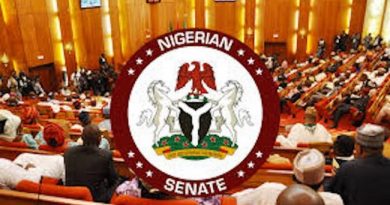Buhari Set to Announce PIA Implementation Committee Today
President Muhammadu Buhari will announce the implementation committee for the Petroleum Industry Act (PIA) today.
According to information obtained by the Newera News, the committee may be chaired by either the Minister of State for Petroleum Resources, Mr. Timipre Sylva or someone with good knowledge of development economics.
The committee which has 12 months to carry out its tasks, would be saddled with the responsibility of establishment of Nigeria Upstream Regulatory Commission, Nigeria Midstream and Downstream Regulatory Authority as well as the corporatisation of the Nigerian National Petroleum Corporation (NNPC) to a Limited Liability Company, which will now be called Nigerian National Petroleum Company Limited.
In addition, the committee would also be tasked with the responsibility of determining the assets and liabilities of the NNPC, which would be transferred to NNPC Limited.
Also, the committee would be tasked with the responsibility of determining the stranded or toxic assets and liabilities which would be taken over by the government.
“The committee has 12 months to finish its job. Also, the committee will look into the conversion of the Oil Prospecting Licences (OPL) and Oil Mining Licences (OML) to Petroleum Prospecting Licences (PPL) and Petroleum Mining Licences (PML) respectively, which are the new names under the Act,” the source who preferred to remain anonymous added.
The PIA which was birthed on Monday would serve as the framework for the operations in the oil and gas industry. The law which had suffered several setbacks since 2008, when it was first presented to the National Assembly, aims at removing legal and regulatory uncertainties that have held back the industry’s growth.
The PIA provides a legal, governance, regulatory and fiscal framework for the Nigerian petroleum industry, the development of host communities, and related matters.
But the federal government yesterday clarified that it is not going to immediately remove the current subsidy being paid on the pump price of petrol, saying that it intends to manage the process to ensure that vulnerable Nigerians are not heavily impacted.
However, while members of the organised private sector and the president’s All Progressives Congress (APC) yesterday welcomed the PIA, saying it would unlock investment opportunities in Nigeria’s oil and gas sector, Rivers State Governor, Nyesom Wike has described the three per cent allocation for host communities in the Niger Delta region as contained in the PIA as meagre.
FG: No Immediate Removal of Petrol Subsidy
The federal government has said it will not immediately end its current subsidy regime, saying it intends to manage the process to ensure that vulnerable Nigerians are not heavily impacted.
Sylva, who spoke at a briefing in Abuja, to mark his two years in office, noted that although desirable, operationalising the free-market regime would require that a lot of economic shock absorbers will be out in place.
Sylva noted that because deregulation would come with a lot of changes, it would not be advisable to suddenly remove the subsidy, saying it would become a reality when the law becomes fully operational.
“It (deregulation) is something that is desirable, which I have always said. I’ve never deviated from that. Deregulation is desirable because that is the sustainable way out of where we are. But also, the reality is that deregulation is going to come with some changes.
“And of course, when people have been used to certain behaviours, behavioural patterns which means you’ve been used to the subsidy for this long, and you want to change that, you have to have some kind of change management process in place.
“You cannot just change the policy on everybody without looking at some of the problems that this might create. One of which is that we know that this is going to entail an increase in price. How do we alleviate the problems that will come with this increase?
“This is not a mindless government. It is a government that really, really cares about the Nigerians. So, we have to really look at all these possibilities of how to at least alleviate the pains and the problems that this increase might occasion. And that’s why we are taking our time. And that’s why it will not happen overnight.
“But I’m just telling you that there is a provision in PIA that will make this happen, that we have to jointly ensure that we’re able to come up with a workable way of making this happen. And that process is already ongoing,” he stated.
He admitted that although the new law has actually deregulated the sector, it wouldn’t mean that there would be an immediate implementation of pricing.
The minister further said that governors were asking for deregulation and by extension a price increase because it would be in their interest, adding that a hike means they would have access to more revenue from the federation account.
He noted that governors are currently getting less from the federation, saying that they had realised that in the end, they are just cutting their noses to spite their face with subsidy.
Also, contrary to the position of the Group Managing Director of the NNPC, Mallam Mele Kyari, that Nigeria was consuming about 103 million petrol daily, Sylva described that figure as a “flash” which happens once in a while, pegging the figure at 52 million litres daily consumption on the average.
“But of course, you know we have flashes. Sometimes, we have these flashes. The daily consumption was at about 66 million litres per day when we came in and were able to bring it down to about 52 million. That’s really the average.
“But once in a while, you have that flash and it goes up, maybe because of the activity of smugglers. Well, those are not really the ideal situations, so you cannot really use that as the measure of what is the average consumption.
“The average product consumption has actually reduced from about 66 million on average. But of course, you can’t discount these flashes that you have, which you cannot really judge us on,” he added.
On the host communities’ fund, the minister explained that it was better to have three per cent of what the communities are sure of.
He described all the levies and taxes paid by oil companies as a balancing act, saying the new legislation has been fair to the host communities and pointing out that for the first time, there is now a pool of funds targeted at the host communities in this country.
On the rising prices of cooking gas, the minister stated that the market has been fully deregulated, emphasising that the government was no longer in control of how much the product is sold.
“We are not in a position to determine gas pricing because gas is not a regulated product. But then we are also very concerned that prices are high. We are also doing something about it.
“Just in the interest of the ordinary Nigerian, I have discussed with some of the suppliers. But I can tell you that it is not really our role. But just in the interest of Nigerians, we are trying to see how we can intervene with the suppliers and have discussions to allow us to see how we can bring down the price of gas to make it more affordable.
“I understand that the average cost of cylinder now is N5,000 to N6,000. But we are following the price and we are doing something about it with the suppliers,” he explained.
The minister who also took time to explain the frontier exploration fund noted that the frontier territories are not only in one area of the country.
“There are frontier territories in Cross River, in the northeast and in the South-west. So when people just locate frontier territories in one part of the country and settle on that, then there’s a problem. So, we must come together as a country, frontier and host communities,” he advised.
He argued that Nigeria has had about 37 billion barrels reserve for the past 10 years and has not added to it, saying there was a need to bring vigour into the industry.
“We cannot go back to where we are coming from. Let’s look forward as a country, we must look at Nigeria. First, who is the one that is gaining? And I think, in this case, it is Nigeria that is the ultimate beneficiary,” he noted.
Sylva added that the sector has been able to reduce the cost of production by over 5 per cent, despite the issues of currency fluctuations, as the industry has rationalised contracts, renegotiated others, while many expatriates who were paid in hard currency left because of COVID-19 pandemic, allowing Nigerians to step in.
OPS Hails Buhari, Call for Transparent Implementation of New Law
Meanwhile, representatives of the Organised Private Sector of Nigeria (OPSN) have commended the federal government over the PIA.
Both the Director-General of the Nigerian Association of Chambers of Commerce, Industry, Mines and Agriculture (NACCIMA), Ambassador Ayo Olukanni, and the Director-General of the Nigeria Employers’ Consultative Association (NECA), Dr. Timothy Olawale, said the PIA was a landmark decision.
The representatives of the OPSN, in separate statements, noted that the PIA 2021, would herald a positive change in the oil and gas industry, noting that they looked forward to a more robust industry with improved investor confidence and the creation of more employment opportunities for the generality of Nigerians.
Olawale stated that “the relevant changes to the governance, administration, the regulatory and fiscal framework of the petroleum industry will enhance transparency and further position the industry to contribute effectively to national development.
“While some provisions of the PIA are far-reaching with various degrees of implication and consequences for operators in the industry, we urge the government to create a platform of proactive and continuous engagement with the operators in the sector for a smooth implementation of the provisions of the PIA.”
He urged the federal government to carry stakeholders along in setting up the implementation and monitoring committee in order to ensure the maximisation of the benefits inherent in the PIA.
Speaking in the same vein, Olukanni, said NACCIMA expects that the PIA would reposition the Nigerian oil and gas sector to attract more investments.
He said: “The NACCIMA welcomes the signing into law of the PIB by President Buhari. After a long journey, the Association commends this bold and strategic step to reposition the Nigerian oil and gas sector to restore investor confidence and attract much needed Foreign Direct Investment (FDI) and local participation.”
He argued that the growth of the sector had been stagnated as a number of principal players, “placed new investments on hold or even divested existing assets due to perceived unstable legal and policy environment.”
The director-general of the NACCIMA also noted that a restructured NNPC and its ownership structure would help create a wider opportunity and space for members and the oil-producing communities to participate.
Olukanni, however, noted that NACCIMA was of the view that the PIA should be implemented in a structured and disciplined manner in order for it to achieve its purpose in the long run.
He said: “Such an implementation approach will ensure transparency and focus while reinforcing confidence among local and international players.
“It is also the view of the association that the private sector is in a prime position to drive the realisation of the objectives of the PIB and as such should receive the requisite support and policy enablement to play this key role in the upstream, midstream and downstream segments.”
In his contribution, a former Senior Technical Adviser, Upstream and Gas, at the Ministry of Petroleum, Gbite Adeniji, yesterday said the PIA would cut wastages in the oil and gas industry.
Speaking on Arise Television, THISDAY’s broadcast arm, Adeniji, who was an adviser when Dr. Ibe Kachikwu was petroleum minister, said the new law is not only a petroleum sector reform document but economic legislation that could remarkably impact the country.
He explained that the Act would open the petroleum sector up to a new wave of opportunities, stressing that the country now has a basis for deregulating the downstream.
“We can cut away all the subsidies that we have completely mismanaged in the last 20 or more years, and redirect some of that towards more useful social and economic needs in the country.
“It also creates the opportunity for leveraging on Nigeria’s main abundant natural resource, which is natural gas, because if you look at the law, it’s got provisions galore on natural gas.
“And this is the first time ever, we actually have provisions dealing with that endowment. So when you think of the energy transition, if you have clarity around the legislative framework for gas, I think that basically positions Nigeria for that future,” he said.
Adeniji emphasised the need to move quickly into a gas-based industrialisation era, stressing that the new law also addresses issues around environmental regulation in the industry, both upstream, midstream and downstream.
He explained that as Nigeria liberalises its oil and gas industry, it also needs laws that would curtail the potential for abuses and monopoly, which the new legislation substantially addresses, saying aside from the NNPC, the industry has a number of monopolies operators currently.
“So, there’s a statutory duty to move away from subsidies. We then have to now see how they set up the regulatory agencies, and how they actually go about implementing the mandate, which is to see that the wholesale transactions as well as seeing petroleum products being sold on a willing buyer, willing seller basis, as opposed to the way we are doing things currently,” he said.
He noted that there would be a need to appoint experienced management consultants to support the process to see to the proper design of the new national oil company, which the law envisages.
While stressing that six months might be too short to do a proper job of assessing and unpacking the assets that are not critical to the future of the new national oil company, including the issue of liabilities, Adeniji noted that competent hands should be hired to turn around the fortunes of the corporation.
On the refineries, he stated that although currently a liability, the facilities have the capacity to begin to add massive value to the operations of the corporation when they start working.
With PIA, Buhari Has Shown Courage, Says APC
In its reaction, the All Progressives Congress (APC) said President Buhari showed courage by signing the Petroleum Industry Bill (PIB) 2021 into law, ending the long jinx which had seen the bill delayed since early 2000.
The National Secretary of Caretaker/Extraordinary Convention Planning Committee (CECPC), Sen. John Akpanudoedehe, in a statement yesterday, said the economy would be the ultimate beneficiary.
He said the new legislation would overhaul the oil and gas industry. He further said it would also provide legal, governance, regulatory and fiscal framework for the Nigerian petroleum industry, the development of host communities as well as offer new fiscal incentives to investors.
Akpanudoedehe added, “The new Petroleum Industry Act may not be a perfect document. No law anywhere in the world is a finished product. It is a good way to start, after decades of groping in the dark in the oil industry.
“Mr. President has broken the jinx on many fronts, this is a clear demonstration of the will of a leader, determined to do the right thing. We salute the President’s forthrightness and his courage to lead Nigeria right.”
The secretary stressed that before now, Nigeria’s oil and gas industry used to lose as much as $15 billion in investments annually due to the delayed passage of the PIB, adding that this was about to change with the Petroleum Industry Act.
Akpanudoedehe argued the Peoples Democratic Party (PDP) attacks of the PIA showed that the opposition party was ready to play politics with the historic feat.
“We ask, what was the fate of the PIB during the wasted 16 years the PDP was in government? We will let the discerning public be the judge. Meanwhile, the APC will not get tired of righting the PDP’s wrongs,” he said.
Rivers State: 3% Allocation to N’Delta Communities Meagre
However, Wike has described the three per cent allocation for host communities in the Niger Delta region as contained in the Act as meagre.
The governor commended the passage of the law, stated that the stipulated allocation for the host communities of oil exploitation was unacceptable.
Speaking in Port Harcourt yesterday, Wike said: “We believe that three per cent is not enough as regards the kind of pollution and environmental crisis we have had because of oil exploitation. I thought what Mr. President would have done was to tell members of the National Assembly, yes, you have done what you are supposed to do, but again, you need to take into consideration the yearnings of the host communities.”
The governor bemoaned the exclusion of oil-producing state governments in the implementation and administration of the three per cent oil revenue recommended for host communities in the PIA.
He expressed concern that the international oil companies would take advantage of this, to continually instigate crises in oil-producing communities in order not to pay the three per cent due to the host communities.
Speaking on the ongoing constitutional amendment process, Wike said it was satisfying to know that such function was not an exclusive preserve of the National Assembly.
“The confidence people have today is that the amendment of the constitution will get to the states. Take, for example, the federal government may not be in support of state police, but you have two-third of states that say they need state police, so in that case, state police will pass. There are issues that you may not like, but these are done on a clause by clause basis.”




